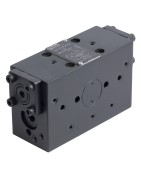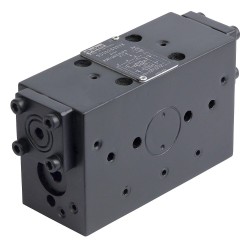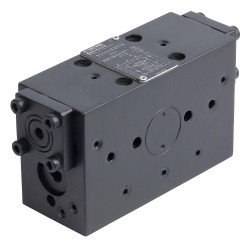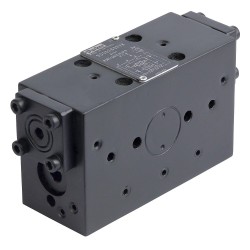Pressure Intensifier - Series SD500
Parker's proven pressure intensifiers series SD500 are used wherever a particular section of a hydraulic system has to be pressurized to a substantially higher pressure than the available primary pressure (clamping functions). With an intensification ratio of 1 : 4 (1 : 2, 1 : 6), the SD500 enables a cost-effective system solution for machine tools, especially in clamping applications, with primary pressures up to 125 bar.
A pilot operated check valve can be flanged underneath the pressure intensifier for quick filling and decompression of the high-pressure section.
Markets:
• Industrial
• Machine tools
Features/Benefits:
• Compact design, mounting pattern NG06, DIN 24 340 Design A, CETOP,
ISO - for quick, easy integration
• Proven technology, volume flow formed with low pulsation- enables reliable operation
• High pressure up to 500 bar
• Ensures always the right pressure intensification ratio
• Short delivery time - no warehousing necessary
• Check valve attachable to bottom flange
Applications:
• Suitable for general hydraulic applications
• Machine tools
Main functional parts of the pressure intensifier:
• Piston
• Rocker mechanism
• Slide valve with lock
• 4 check valves which separate the high-pressure section from the low pressure section
• Check valve in the tank port to partition of the tank section from the primary pressure
Function:
After the high-pressure section is filled with oil, (e.g. extension of a clamping cylinder), the pressure intensifier begins operation: The low pressure moves the intensifier piston because of the surface ratio and compresses the oil column in the high pressure section. At the end of the intensifier’s piston stroke, the rocker crossed switching position, and the intensifier piston pumps oil from the piston rod area into the high-pressure section. The process repeats itself until the pressure ratio corresponding to the surface ratio has led to a balance of force on the intensifier piston.
The pressure intensifier switches itself off and immediately on again when the high pressure (e.g. due to external leakage) begins to drop (pay attention to the flow characteristics). The switching speed of the slide valve is dependent on the operating speed of the intensifier piston.
Note:
• To avoid exceeding the admissible maximum pressure, a pressure relief or pressure control valve must be fitted on the primary side (pressure setting, max. 125 bar / 1 : 4, max. 250 bar / 1 : 2 or max. 83 bar / 1 : 6)
• There must be no pressure peak on the primary side when operating in the maximum pressure range
• It is recommended to mount a 10µm filter on the primary side to ensure damage-free operation
A pilot operated check valve can be flanged underneath the pressure intensifier for quick filling and decompression of the high-pressure section.
Markets:
• Industrial
• Machine tools
Features/Benefits:
• Compact design, mounting pattern NG06, DIN 24 340 Design A, CETOP,
ISO - for quick, easy integration
• Proven technology, volume flow formed with low pulsation- enables reliable operation
• High pressure up to 500 bar
• Ensures always the right pressure intensification ratio
• Short delivery time - no warehousing necessary
• Check valve attachable to bottom flange
Applications:
• Suitable for general hydraulic applications
• Machine tools
Main functional parts of the pressure intensifier:
• Piston
• Rocker mechanism
• Slide valve with lock
• 4 check valves which separate the high-pressure section from the low pressure section
• Check valve in the tank port to partition of the tank section from the primary pressure
Function:
After the high-pressure section is filled with oil, (e.g. extension of a clamping cylinder), the pressure intensifier begins operation: The low pressure moves the intensifier piston because of the surface ratio and compresses the oil column in the high pressure section. At the end of the intensifier’s piston stroke, the rocker crossed switching position, and the intensifier piston pumps oil from the piston rod area into the high-pressure section. The process repeats itself until the pressure ratio corresponding to the surface ratio has led to a balance of force on the intensifier piston.
The pressure intensifier switches itself off and immediately on again when the high pressure (e.g. due to external leakage) begins to drop (pay attention to the flow characteristics). The switching speed of the slide valve is dependent on the operating speed of the intensifier piston.
Note:
• To avoid exceeding the admissible maximum pressure, a pressure relief or pressure control valve must be fitted on the primary side (pressure setting, max. 125 bar / 1 : 4, max. 250 bar / 1 : 2 or max. 83 bar / 1 : 6)
• There must be no pressure peak on the primary side when operating in the maximum pressure range
• It is recommended to mount a 10µm filter on the primary side to ensure damage-free operation




